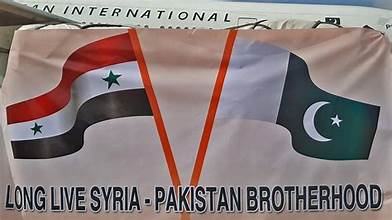In a significant development aimed at strengthening bilateral ties and boosting economic collaboration, Pakistan and Syria have agreed to form a Joint Working Group (JWG) on Agricultural Cooperation. This step marks a renewed commitment between the two nations to enhance cooperation in one of the most critical sectors of their economies: agriculture. Both countries have long-standing agricultural traditions, and the collaboration aims to create opportunities for knowledge sharing, technology exchange, and improved food security.
Historical Background of Pakistan-Syria Relations
Pakistan and Syria share deep-rooted historical, cultural, and religious ties. Over the decades, the two nations have maintained diplomatic relations, with a focus on mutual respect and support in international forums. However, political instability and regional conflicts in the Middle East affected bilateral trade and cooperation.
In recent years, Pakistan has shown a keen interest in revitalizing its ties with Syria. The formation of a Joint Working Group on Agricultural Cooperation symbolizes not only economic collaboration but also political goodwill and an intent to build sustainable development bridges.
Why Agriculture?
Agriculture is the backbone of Pakistan’s economy, contributing nearly 20% to its GDP and employing about 40% of the labor force. Similarly, Syria, despite challenges caused by years of conflict, has historically been an agricultural hub in the Middle East, producing wheat, cotton, fruits, olives, and livestock.
The decision to prioritize agriculture in bilateral cooperation stems from several key factors:
- Food Security: Both countries face food security challenges due to climate change, population growth, and external economic pressures.
- Shared Crops and Practices: Wheat, barley, and cotton are vital crops in both countries, making agricultural cooperation mutually beneficial.
- Technology Gaps: Pakistan can benefit from Syria’s expertise in dryland farming, while Syria can gain from Pakistan’s advances in hybrid seed technology and irrigation methods.
- Employment Generation: Agriculture remains one of the largest sources of employment for both nations. Enhancing productivity in this sector directly supports livelihoods.
Objectives of the Joint Working Group
The establishment of the Joint Working Group is designed to achieve several objectives:
- Knowledge Sharing: Exchange of expertise on crop cultivation, pest control, and water management.
- Research and Development: Joint initiatives for agricultural research, particularly in climate-resilient crops.
- Trade Promotion: Opening new avenues for agricultural trade, including fruits, vegetables, and processed foods.
- Technology Transfer: Collaboration on mechanized farming, irrigation technologies, and seed development.
- Capacity Building: Training programs for farmers, agricultural officers, and policymakers from both sides.

Potential Areas of Cooperation
The Joint Working Group is expected to cover a wide range of agricultural areas. Some of the most promising include:
1. Seed Development
Pakistan has developed hybrid seeds for crops such as wheat, rice, and maize, which can be shared with Syria. In return, Syria’s experience in cultivating drought-resistant crops can benefit Pakistani farmers facing water shortages.
2. Irrigation Technology
Water scarcity is a growing challenge for both countries. Joint research on drip irrigation, water recycling, and efficient canal systems could enhance agricultural output.
3. Livestock and Dairy
Both nations have significant livestock populations. Cooperation in veterinary health, dairy processing, and meat export standards could unlock new markets and boost rural incomes.
Pakistan and Syria to Establish Joint Working Group on Agricultural Cooperation
4. Olive and Fruit Cultivation
Syria is well-known for olive production, while Pakistan has been expanding its fruit exports. Joint ventures in olive oil extraction and fruit processing could create export opportunities for both.
5. Agro-Industrial Development
The value-added agricultural industry, such as food processing, packaging, and storage facilities, can be developed with joint investment. This would reduce post-harvest losses and increase profitability.
Benefits for Pakistan
Pakistan stands to gain significantly from this cooperation:
- Access to Middle Eastern Markets: Through Syria, Pakistan can strengthen its agricultural trade with the Arab world.
- Adoption of New Techniques: Syrian expertise in farming under arid conditions can help Pakistani farmers in dry regions like Balochistan and Tharparkar.
- Diplomatic Leverage: Strengthened ties with Syria enhance Pakistan’s role in regional diplomacy, particularly in the Middle East.

Benefits for Syria
Syria also gains notable advantages:
- Technological Support: Pakistani advances in hybrid seeds and mechanization can boost Syrian agricultural recovery after years of conflict.
- Food Imports: Pakistan can become a stable source of wheat, rice, and pulses, addressing Syria’s food security concerns.
- Skill Development: Syrian farmers and agricultural professionals can benefit from training programs and joint research projects with Pakistani institutions.
Challenges Ahead
While the formation of a Joint Working Group is promising, several challenges must be addressed for this initiative to succeed:
- Political Instability: Regional tensions and ongoing conflict in Syria may hinder consistent implementation.
- Infrastructure Gaps: War-damaged infrastructure in Syria poses hurdles for smooth trade and technology transfer.
- Financial Constraints: Both countries face economic difficulties that could limit large-scale investment.
- Bureaucratic Hurdles: Delays in policy approvals and regulatory differences may slow progress.
The Way Forward
To make the Joint Working Group effective, both governments need to adopt practical steps:
- Regular Meetings: The JWG must hold biannual or quarterly meetings to track progress and address obstacles.
- Pilot Projects: Launching small-scale joint projects in areas like seed development or drip irrigation can create success stories and attract investment.
- Private Sector Involvement: Encouraging participation of private agribusinesses will provide funding and innovation.
- International Partnerships: Collaborating with international organizations like FAO (Food and Agriculture Organization) can provide technical and financial support.
- Trade Agreements: Simplifying trade regulations between Pakistan and Syria will ensure smoother agricultural exports and imports.
Conclusion
The decision by Pakistan and Syria to establish a Joint Working Group on Agricultural Cooperation is a timely and strategic move. Agriculture not only sustains millions of livelihoods in both countries but also holds the key to economic growth and food security. By sharing expertise, advancing research, and promoting agricultural trade, both nations stand to benefit immensely.
Although challenges such as political instability and financial constraints exist, the potential gains far outweigh the risks. With focused efforts, transparent policies, and active involvement of both governments and private sectors, this partnership could pave the way for a new era of agricultural collaboration in the region.
As Pakistan and Syria move forward with this initiative, it is hoped that the cooperation will not only uplift their agricultural sectors but also strengthen bilateral relations, promote regional stability, and serve as a model of South-South cooperation in the years to come.



